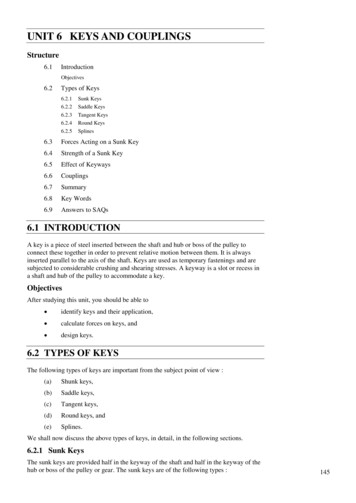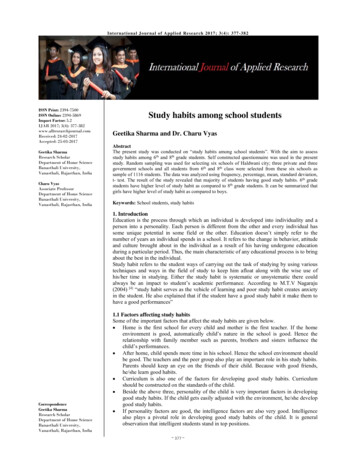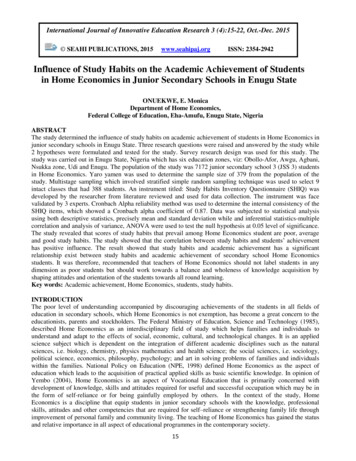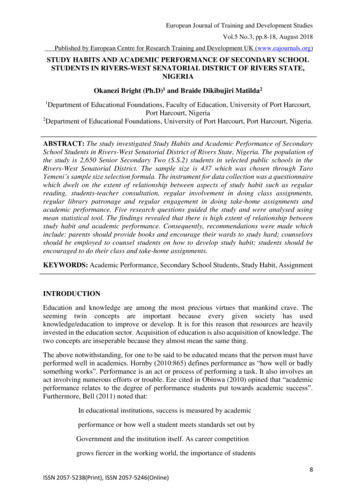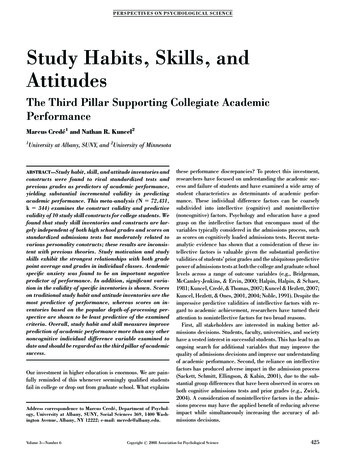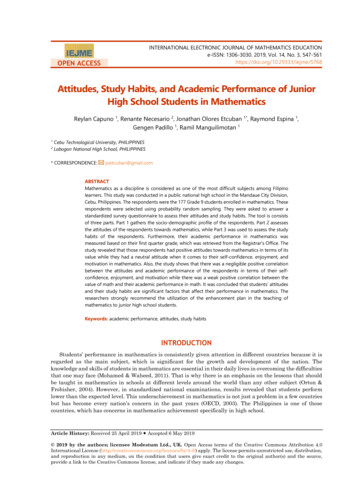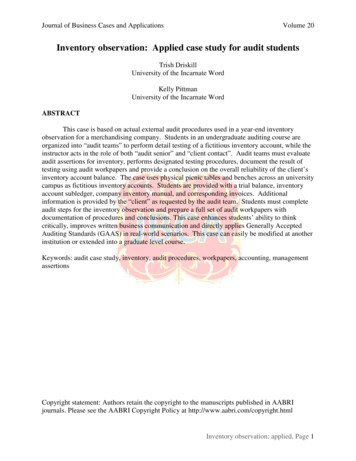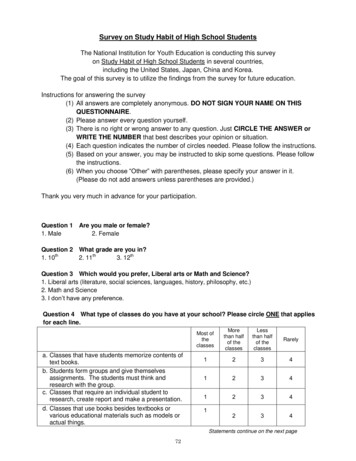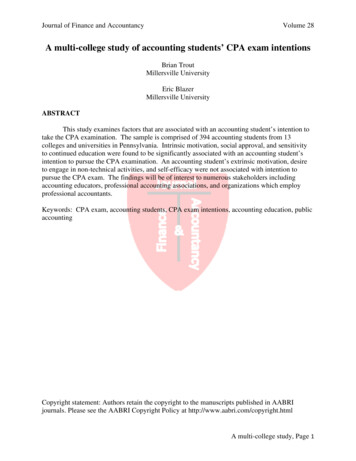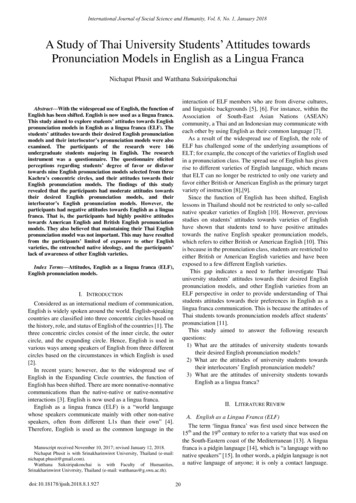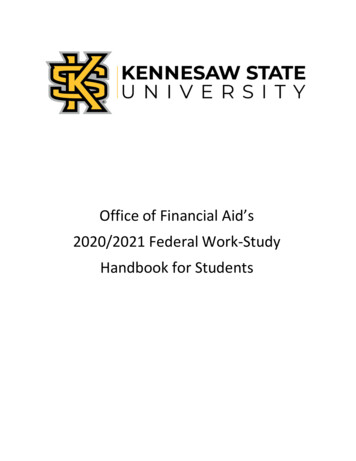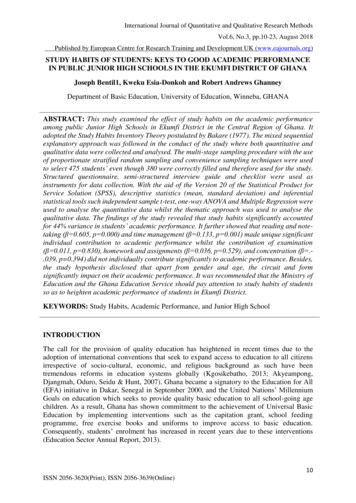
Transcription
International Journal of Quantitative and Qualitative Research MethodsVol.6, No.3, pp.10-23, August 2018Published by European Centre for Research Training and Development UK (www.eajournals.org)STUDY HABITS OF STUDENTS: KEYS TO GOOD ACADEMIC PERFORMANCEIN PUBLIC JUNIOR HIGH SCHOOLS IN THE EKUMFI DISTRICT OF GHANAJoseph Bentil1, Kweku Esia-Donkoh and Robert Andrews GhanneyDepartment of Basic Education, University of Education, Winneba, GHANAABSTRACT: This study examined the effect of study habits on the academic performanceamong public Junior High Schools in Ekumfi District in the Central Region of Ghana. Itadopted the Study Habits Inventory Theory postulated by Bakare (1977). The mixed sequentialexplanatory approach was followed in the conduct of the study where both quantitative andqualitative data were collected and analysed. The multi-stage sampling procedure with the useof proportionate stratified random sampling and convenience sampling techniques were usedto select 475 students’ even though 380 were correctly filled and therefore used for the study.Structured questionnaire, semi-structured interview guide and checklist were used asinstruments for data collection. With the aid of the Version 20 of the Statistical Product forService Solution (SPSS), descriptive statistics (mean, standard deviation) and inferentialstatistical tools such independent sample t-test, one-way ANOVA and Multiple Regression wereused to analyse the quantitative data whilst the thematic approach was used to analyse thequalitative data. The findings of the study revealed that study habits significantly accountedfor 44% variance in students’ academic performance. It further showed that reading and notetaking (β 0.605, p 0.000) and time management (β 0.133, p 0.001) made unique significantindividual contribution to academic performance whilst the contribution of examination(β 0.011, p 0.830), homework and assignments (β 0.036, p 0.529), and concentration (β .039, p 0.394) did not individually contribute significantly to academic performance. Besides,the study hypothesis disclosed that apart from gender and age, the circuit and formsignificantly impact on their academic performance. It was recommended that the Ministry ofEducation and the Ghana Education Service should pay attention to study habits of studentsso as to heighten academic performance of students in Ekumfi District.KEYWORDS: Study Habits, Academic Performance, and Junior High SchoolINTRODUCTIONThe call for the provision of quality education has heightened in recent times due to theadoption of international conventions that seek to expand access to education to all citizensirrespective of socio-cultural, economic, and religious background as such have beentremendous reforms in education systems globally (Kgosikebatho, 2013; Akyeampong,Djangmah, Oduro, Seidu & Hunt, 2007). Ghana became a signatory to the Education for All(EFA) initiative in Dakar, Senegal in September 2000, and the United Nations’ MillenniumGoals on education which seeks to provide quality basic education to all school-going agechildren. As a result, Ghana has shown commitment to the achievement of Universal BasicEducation by implementing interventions such as the capitation grant, school feedingprogramme, free exercise books and uniforms to improve access to basic education.Consequently, students’ enrolment has increased in recent years due to these interventions(Education Sector Annual Report, 2013).10ISSN 2056-3620(Print), ISSN 2056-3639(Online)
International Journal of Quantitative and Qualitative Research MethodsVol.6, No.3, pp.10-23, August 2018Published by European Centre for Research Training and Development UK (www.eajournals.org)However, scholars are convinced that it is not enrolment per se, but rather the quality ofeducation and learning outcomes that is more strongly linked with a country’s economicdevelopment (Hanushek & Wobmann, 2009). Intuitively, it could be concluded that increasein enrolment is necessary but an insufficient indicator of education success. According toAmpofo and Osei-Owusu (2015), academic achievement is one of the key defining indicatorsof student educational success. This assertion implies that poor academic performance ofstudents is evident of lack of necessary capacities for socio-economic progress and personalfulfillment. It could be inferred from the above views that students’ academic achievement isa measure of quality education and the key to a country’s progress.Extant literature has documented various factors which either bolster or throttle the academicperformance of students. In their study, Tshabalala and Ncube (2013) observed that inadequateinstructional materials, inappropriate teaching methods, teachers self-motivation and lack offunds strongly affect the academic performance of students. Consistent with this revelation,Nyaboga, Bosire and Ajowi (2016) unveil internal and external classroom factors to affectstudents academic performance. According to these scholars, internal factors such as teachercompetency, class size, inadequate teaching and learning materials, and teacher motivationinfluences students academic performance. Scrutiny of the above factors indicates that most ofthem are beyond the control of students. For instance, school-related factors such as supervisionand class size are determined by policies which students do not control. What students havecontrol over is their study habits (Gettinger & Seibert, 2002). Romeo (2006) concurs thatstudents cannot learn simply by being told what to do or by watching others but rather theyhave to practice studying habitually. He stressed that students’ success hinges on theireffectiveness, efficiency and concentration on studying and these are affected by the learningmaterials they use and the way they use it. Implicitly, it could be said that even though learningresources are vital to students’ success, it hinges on the energy expended by students to studywhere they apply learning resources to their studies.Cardelle-Elawar and Nevin (2003) expound that study habit refers to the conscious and purposeful use of one’s cognitive skills, feelings, and actions to maximize the learning of knowledgeand skills for a given task and set of conditions. Cardelle-Elawar and Nevein (2003) considerstudy habit as the application of an individual’s intelligence, emotions, and activities towardsthe acquisition of knowledge and skills to accomplish an assignment. Logically, effective studyhabit is contingent on keen intellectual competence, stable emotions, and relevant activitiesdeliberately directed to construct knowledge and develop skills so as to attain a goal.Furthermore, Crede and Kuncel (2008) add that review of material, self-testing and rehearsalof learned material are constituents of study habit. The views of these scholars suggest thatstudy habit demands personal commitment of students to grasp concepts, revise, and personallyassess one’s proficiency to ascertain the extent of consolidation of subject matter. Wood andNeal (2007) conclude that study habits are approaches applied to learning. Understandably,good study habits assist students to apply their thought processes to identify relevant bodies ofknowledge and evaluation of same. Conversely, poor study habits impede students’ capacityto engage in constructive intellectual exercise.Empirical research findings exist to endorse the claim that study habits impacts academicperformance (Bashir & Mattoo, 2012). It could be construed that students academicperformance is expected to shrink when they exhibit poor and inappropriate study habit. Intheir observation, Sarwar, Bashir, Khan, and Khan (2009) concluded that overachieverspossessed better study habits than underachievers. Similarly, other studies like Crede and11ISSN 2056-3620(Print), ISSN 2056-3639(Online)
International Journal of Quantitative and Qualitative Research MethodsVol.6, No.3, pp.10-23, August 2018Published by European Centre for Research Training and Development UK (www.eajournals.org)Kuncel (2008) and Nuthana and Yenagi (2009) support the findings of earlier studies that studyhabits impact academic performance of students. They further revealed that students who arebetter in reading and note-taking, well prepared for the board examination and haveconcentration may have better academic achievement. The results of these studies suggest thatgood study habits enhance academic performance whilst poor study habits stifles studentsacademic performance.Researchers have documented the effect of demographic variables of students and how theyimpact on their academic performance. Consequently, studies have unveiled that class level,gender, age, and geographical location of a school are variables that have caught the attentionof previous researchers in determining their impact on academic performance of students. Agap between the achievement of boys and girls has been found with girls showing betterperformance than boys in certain instances (Chambers & Schreiber, 2004). Ceballo, McLoydand Toyokawa (2004) established in their study that student’s gender strongly affects theiracademic performance with girls performing better in the subjects of Mathematics, and Englishas well as aggregate performance. These authors explained that girls usually show more effortsin their studies leading to better grades at school. However, this finding of Ugoji (2008) foundno significant difference in the academic performance of students based on gender.Other studies found that age influences academic performance of students. Previous studies(Zeegers, 2004 & Huang and Invernizzi, 2012) found that mature age students consistentlyperform better on an academics than younger ones. Huang and Invernizzi (2012) found thatyounger students had lower literacy scores than the older students in the same class. Contrarily,Grissom (2004) in his study concluded that there is a negative relationship between age andachievement which remains persists over time. Therefore, when students grow older theiracademic performance diminishes. In this study, young and old students were used as predictorof their academic performance. The young were students who were between the ages of 10 to14. Old were those students who were overage (14 years and above) and still in school as aresult of either late entry or repetition. Some scholars depart from the connection betweenactual age and academic performance when they argue that it is rather the age at which a studententers school that matters.School location and class have also been explored in several studies in connection to academicperformance. According to Akomolafe, and Olaranfemi-Olabisi (2011), school locationinfluences students’ academic achievement. More recently, Igboegwu and Okonkwo (2012)study indicated a significant difference in students’ achievement with respect to location ofschool and education zones. Nonetheless, these researchers did not identify the nature of thelocation that supports superior performance. For class, Bernardi (2014) disclosed that lowergrade students outperform their upper grade students. Based on this result, academicperformance among JHS 1 students could be better than those in JHS 2. The literature hasshown that age, gender, educational zones/school location, and class level are determinants ofacademic performance albeit with conflicting results. These mixed results suggest thatevidence through studies is required to examine the linkage between gender and academicperformance.Meanwhile reports in Ghana have shown that generally, students academic performance at theBasic Education Certificate Examination (BECE) level has been a perturbing issue (Ministryof Education, 2013), and the Ekumfi District is no exception. Students performance at (BECE)in the Ekumfi District is not encouraging as presented in Figure 1.12ISSN 2056-3620(Print), ISSN 2056-3639(Online)
International Journal of Quantitative and Qualitative Research MethodsVol.6, No.3, pp.10-23, August 2018Published by European Centre for Research Training and Development UK (www.eajournals.org)% Fail% 420020122013AveragePerformanceYearsFigure 1 BECE Performance HistorySource: Ekumfi Education Office Statistics Department (2012-2015)It could be observed from Figure 1 that in 2012, 57% passed and 43% failed. Performancehowever took a nosedive in 2013 where 34% passed while 66% failed. In 2014, 73% passedwhile 27% failed. Performance again improved in 2015 as 68% passed while 32% failed. Theinformation has disclosed the average performance pass from 2012 to 2015 is 58% whichindicated that 42% of the students failed each year. Even though studies have reported that poorstudy habits led to poor student academic performance (Bashir & Mattoo, 2012; Huang &Invernizzi, 2012). Similarly, the poor academic performance of the students in the EkumfiDistrict could be attributed to their poor study habits. However, research into the effect betweenstudy habits and students’ academic performance in the Ekumfi District is rare. It is againstthis backdrop that this study is carried out to provide empirical evidence on the effect betweenstudy habits and students’ academic performance in the Ekumfi District.It is anticipated that the findings will help in obtaining contextual data to shed more light onthe effect of study habits on academic performance, thereby expand the frontiers of knowledgein the field. Practically, the researcher hopes that the findings will be significant to educationstakeholders to determine how students’’ study habits affect their (students) academicperformance. This will help them to either intensify or modify their study habits for betteracademic performance.The study was guided by this research question:1.What is the effect of study habits on academic performance of public junior high schoolstudents in the Ekumfi District?The following hypotheses were formulated for the study:H
STUDY HABITS OF STUDENTS: KEYS TO GOOD ACADEMIC PERFORMANCE IN PUBLIC JUNIOR HIGH SCHOOLS IN THE EKUMFI DISTRICT OF GHANA Joseph Bentil1, Kweku Esia-Donkoh and Robert Andrews Ghanney Department of Basic Education, University of Education, Winneba, GHANA ABSTRACT: This study examined the effect of study habits on the academic performance among
